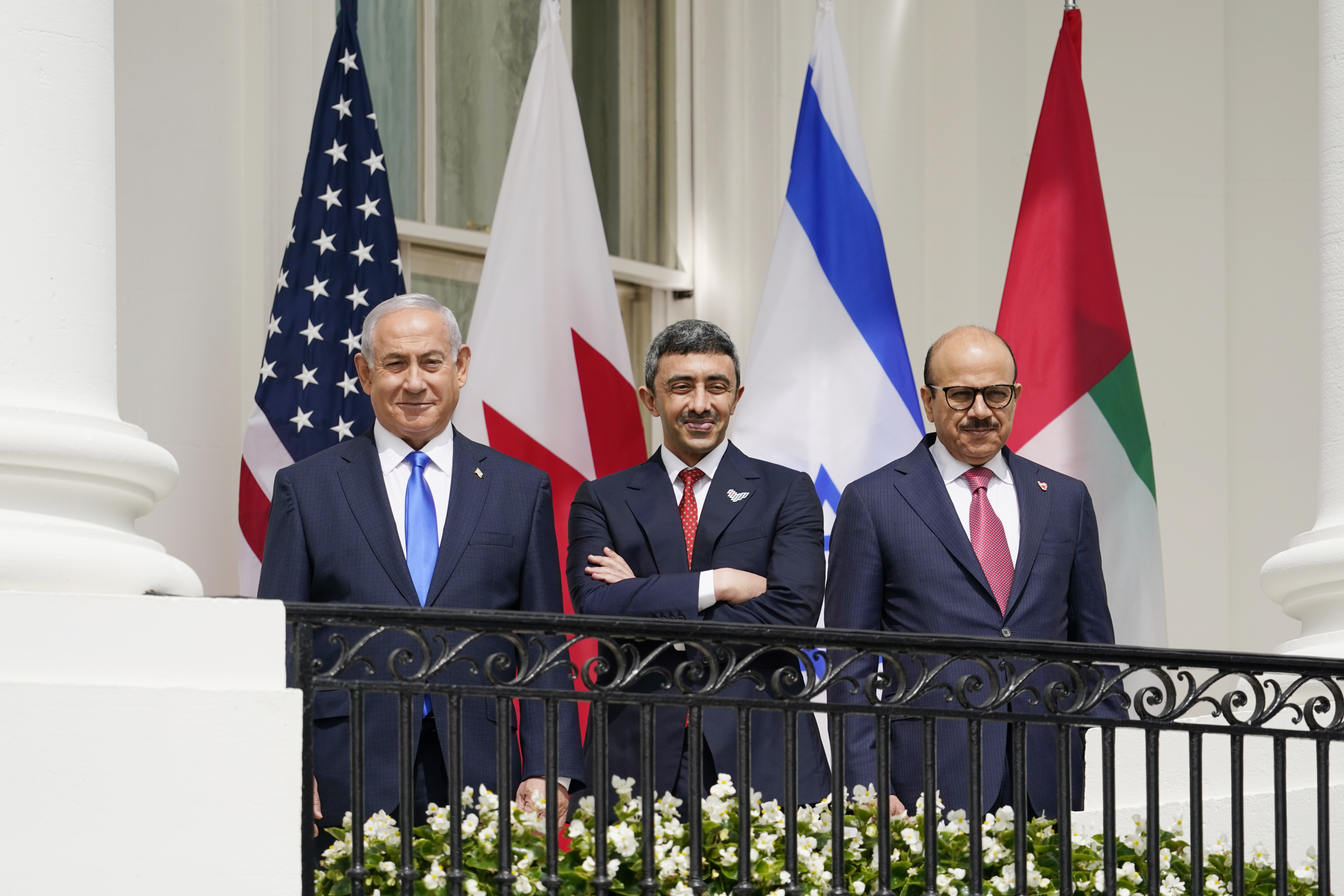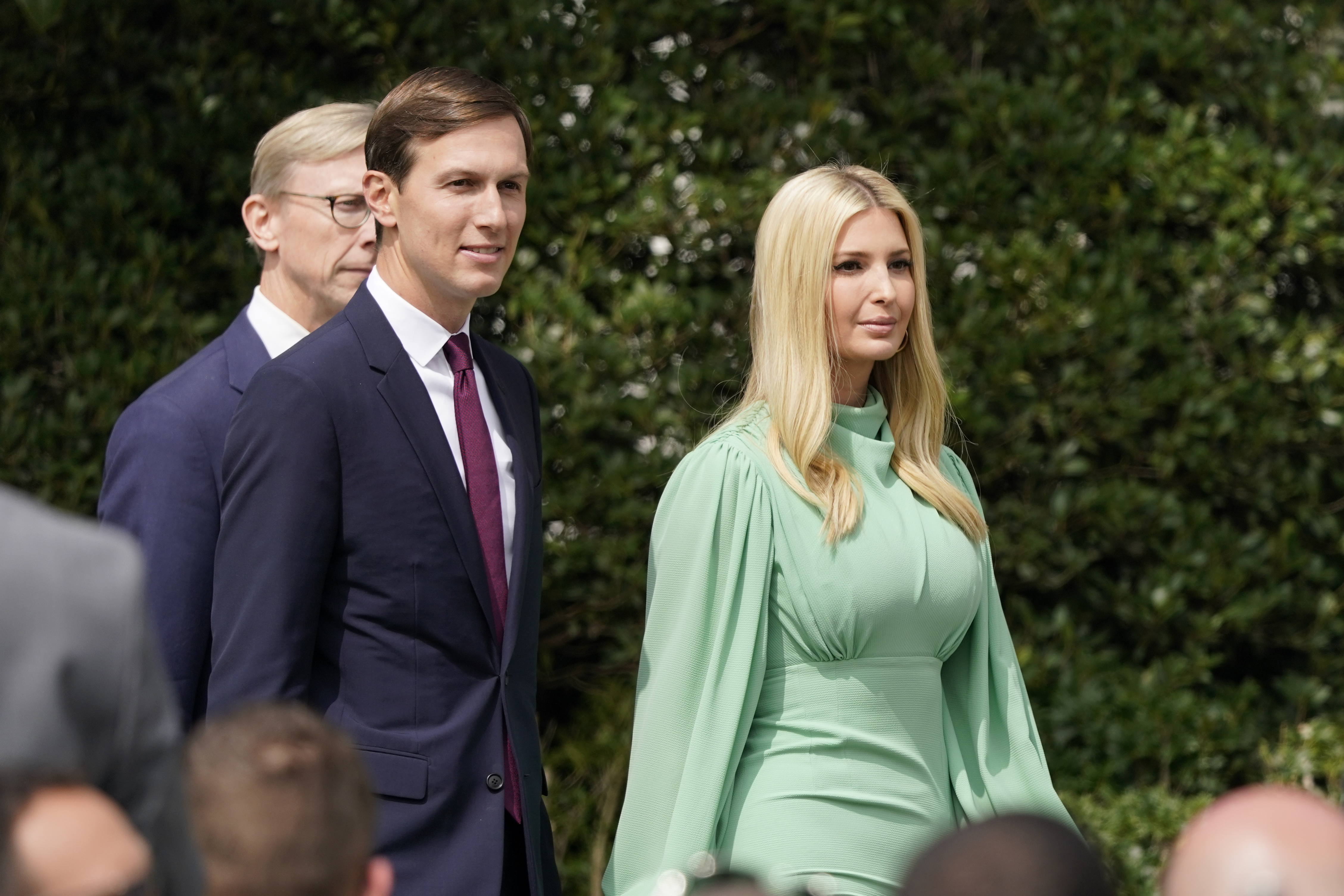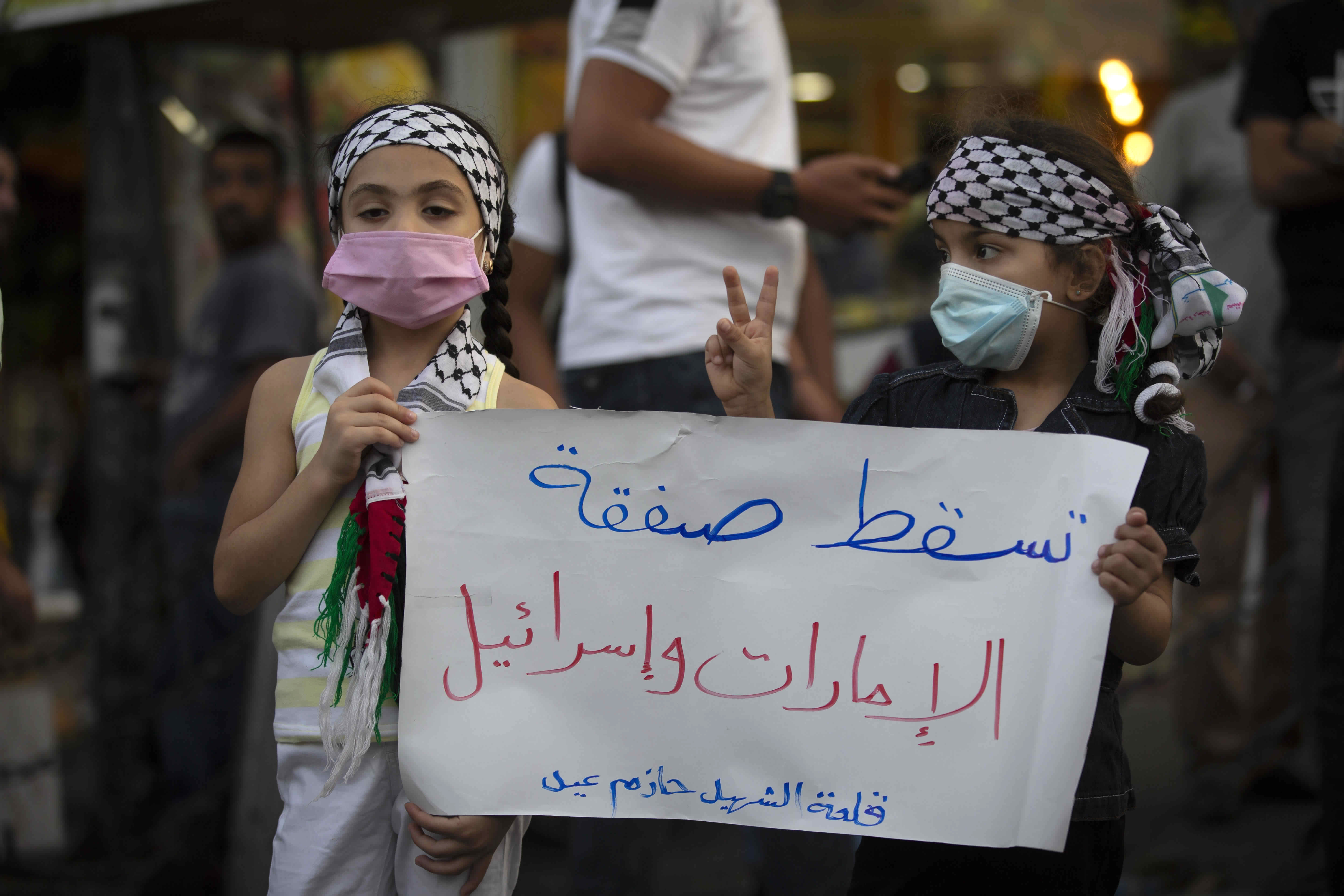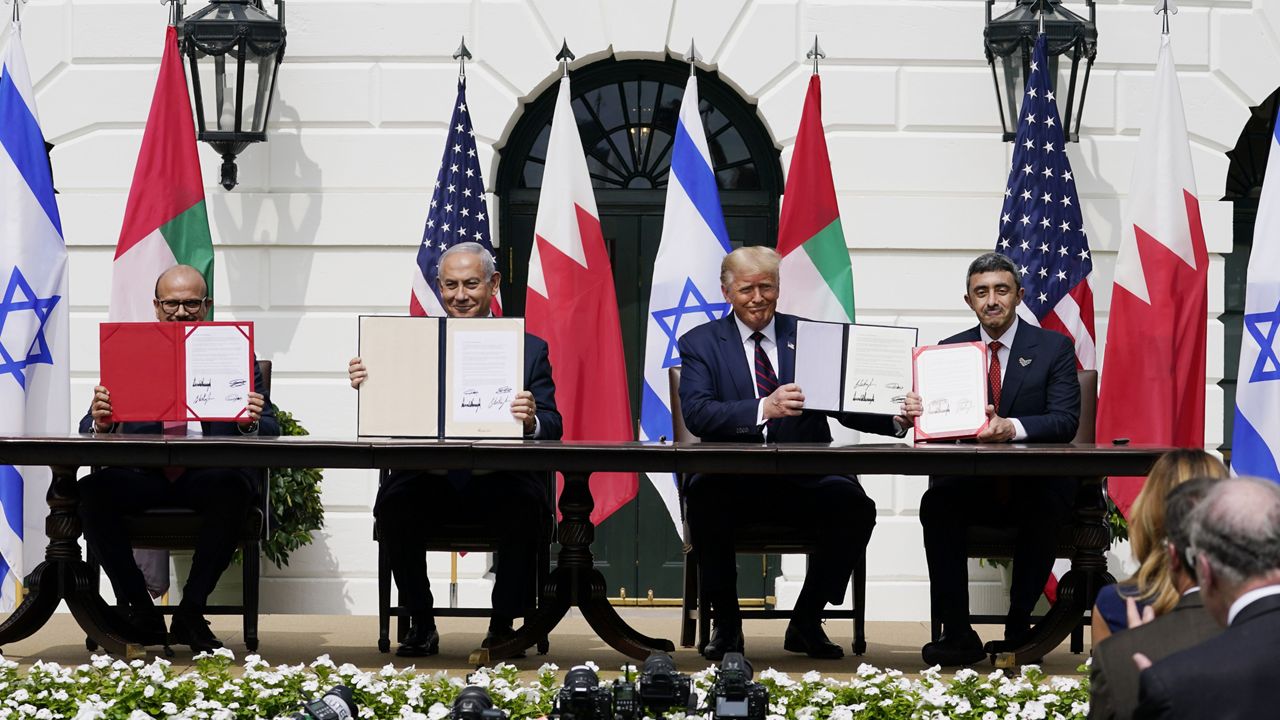WASHINGTON, D.C. — With 49 days to go until the presidential election, President Donald Trump presided over the signing of diplomatic deals between Israel and two Gulf nations, Bahrain and the United Arab Emirates, on Tuesday.
Speaking to a crowd of hundreds of people gathered at the White House's South Lawn, Trump said that they are here to "change the course of history" and called it "an incredible day for the world."
"In Israel's entire history, there have previously been only two such agreements," Trump said. "Now, we have achieved two in a single month."
Trump and his allies hope that the ceremony will bolster his reputation as a peacemaker ahead of the election.
“This can lead to peace, real peace, in the Middle East,” Trump said in the Oval Office before the ceremony as he welcomed Emirati Foreign Minister Sheikh Abdullah bin Zayed Al Nahyan, the brother of Abu Dhabi’s powerful crown prince.
“You can have peace without blood in the sand,” Trump added.

Israeli Prime Minister Benjamin Netanyahu and the Emirati and Bahraini foreign ministers signed the deals before the crowd, which included representatives of supporting nations from the Washington-based diplomatic corps but few other dignitaries from overseas.
Netanyahu spoke to the crowd about the death of his brother, Yonatan Netanyahu, who was killed in the raid on Entebbe Airport in Uganda in 1976 which saw 102 Israeli and Jewish hostages rescued, in addition to other in battle.
"For those who bear the wounds of war cherish the blessings of peace," Netanyahu said.
In addition to the individual bilateral agreements signed by Israel, the UAE and Bahrain, all three signed a trilateral document. The agreements are dubbed the “Abraham Accords” after the patriarch of the world’s three major monotheistic religions.
The agreements won’t end active wars but will rather formalize the normalization of the Jewish state’s already warming relations with the two countries. And, while not addressing the longstanding Israeli-Palestinian conflict, they may pave the way for a broader Arab-Israeli rapprochement after decades of enmity, a pair of wars and only two previous peace deals.
Skeptics, including many longtime Mideast observers, analysts, experts and former officials, have expressed doubts about the impact of the deals and lamented that they ignore the Palestinians, who have rejected them as a stab in the back by fellow Arabs.
Yet even the harshest critics have allowed that they could usher in a seismic shift in the region should other Arab nations, particularly Saudi Arabia, follow suit, with implications for Iran, Syria and Lebanon. Other Arab countries believed to be close to recognizing Israel include Oman, Sudan and Morocco.
Bloomberg reported Monday that Qatar ruled out normalizing relations with Israel, saying that such a move "can't be the answer" to the Israeli-Palestinian conflict.
"We don't think that normalisation was the core of this conflict and hence it can't be the answer," Lolwah al-Khater, Qatar's foreign ministry spokesperson, told Bloomberg.
“These agreements are a huge accomplishment for the countries involved and have led to a tremendous sense of hope and optimism in the region,” said Trump’s son-in-law and senior adviser, Jared Kushner, who led the negotiations. “Instead of focusing on past conflicts, people are now focused on creating a vibrant future filled with endless possibilities.”

As for the Palestinians, “they have an offer on the table,” Kushner told ABC’s “Good Morning America.” “At some point when they decide they want to live better lives, I believe they’ll engage. But you know we can’t want peace for them, for their people, more than they want it themselves.”
The Palestinians have not embraced Kushner’s vision.
A poll released Tuesday found that 86% of Palestinians believe the normalization agreement with the UAE serves only Israel’s interests and not their own. Fifty-three percent of Palestinians described the agreement as a “betrayal” while 17% said it marked the “abandonment” of their cause.
The poll, carried out by the respected Palestinian Center for Policy and Survey Research, found that 92% of Palestinians are opposed to Trump’s Mideast plan. The poll, carried out Sept. 9-12, surveyed 1,270 Palestinians in the occupied West Bank and Gaza and has a margin of error of plus or minus 3%.
Palestinian activists held small demonstrations Tuesday in different parts of the West Bank and in Gaza, where they trampled and set fire to pictures of Trump, Netanyahu and the leaders of the UAE and Bahrain.

During a meeting with Netanyahu in the Oval Office, Trump told reporters that he believed that 5-6 more countries will join the deal with Israel.
"We're talking to the Palestinians, they'll join too," Trump added.
Earlier, Trump told reporters that he "stopped payment" to the Palestinians, saying that "they were not saying nice things for many years."
"Because if they're not going to respect us or if they're not going to speak well of us, we're not going to be involved," Trump said of the Palestinians.
Tuesday’s ceremony follows months of intricate diplomacy headed by Kushner and Trump’s envoy for international negotiations, Avi Berkowitz, that first bore fruit Aug. 13 when the Israel-UAE deal was announced. That was followed by the first direct commercial flight between the countries, and then the Sept. 11 announcement of the Bahrain-Israel agreement.
The specific contents of the individual documents to be signed were not known ahead of the ceremony. While officials said they would hew closely to the joint statements issued when the deals were first announced, it remained unclear if the agreements would require further action by the three governments or what binding obligations they would commit each to enforcing.
A senior White House official said Monday the UAE-Israel agreement would be longer and more detailed than the Bahrain agreement because there had been more time to finalize it. Still, the lack of clarity even a day before the ceremony has raised some suspicions about the durability of the agreements.
Even in Israel, where the accords have received widespread acclaim, there is concern that that they might result in U.S. sales of sophisticated weaponry to the UAE and Bahrain, thus potentially upsetting Israel’s qualitative military edge in the region. Meanwhile, a politically vulnerable Netanyahu is facing questions about appearing at such a large event just days after he announced a new nationwide lockdown to fight a surge in coronavirus cases that will impose severe restrictions on movement and gatherings. The White House is encouraging those attending Tuesday’s ceremony to wear masks.
And while the UAE and Bahrain have a history of suppressing dissent and critical public opinion, there have been indications that the agreements are not nearly as popular or well-received as in Israel. For one, neither country is sending its head of state or government to sign the deals with Netanyahu.
Bahrain’s largest Shiite-dominated opposition group, Al-Wefaq, which the government ordered dissolved in 2016 amid a yearslong crackdown on dissent, said there is widespread rejection in the country of normalization.
Al-Wefaq said in a statement that it joins other Bahrainis who categorically reject the agreement to normalize ties with the “Zionist entity,” and criticized the government for crushing the public’s ability to express opinions “to obscure the extent of discontent” at normalization.
In the UAE, there has been speculation that Abu Dhabi’s Crown Prince Mohammed bin Zayed, widely seen as the country’s day-to-day leader and architect of the Emirati push to improve relations with Israel, is steering clear of the signing ceremony.
Although Emirati protocol dictates that the foreign minister and not the crown prince of a specific emirate be dispatched to represent the country in lieu of the UAE’s president, who’s rarely been seen in public since suffering a stroke more than six years ago, there’s speculation the crown prince is not attending the White House ceremony for political reasons.
He may not want to be seen throwing too much of his support behind Trump weeks ahead of a U.S. presidential election in which the outcome is far from certain. While the pageantry of the White House signing ceremony offers Trump and Netanyahu a political triumph, Prince Mohammed faces neither reelection pressures nor protests at home.
The Emiratis may also be wary of appearing too close to Netanyahu, who publicly stated in August his opposition to the sale of U.S.-made F-35 stealth fighter jets to the UAE.
While the UAE has said that Israel not moving ahead with plans to annex West Bank settlements is a cornerstone of the agreement, Netanyahu has insisted that annexation is only suspended and remains on the table.
The Associated Press contributed to this report.



